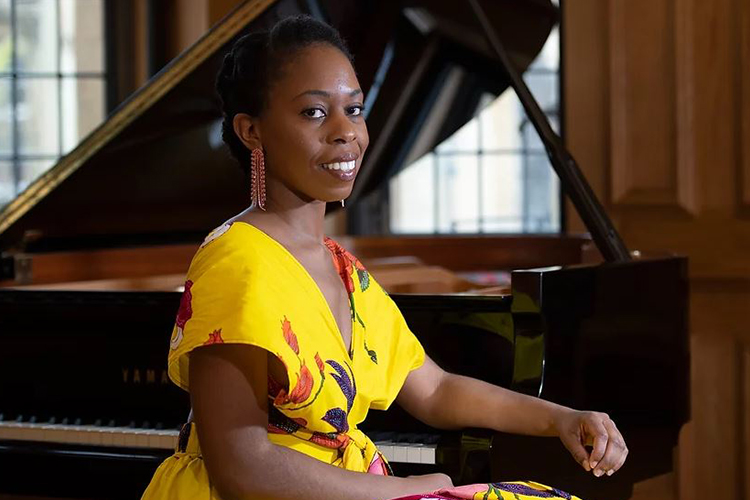
(1875–1912)
As one of the most iconic Black composers of his time, Samuel Coleridge-Taylor had a substantial impact on generations of Black classical musicians. He was born in the Holborn district of London in 1875 to a father from Sierra-Leone and a mother of English ancestry. Coleridge-Taylor started his musical training by playing piano with his mother and singing in church choirs. From 1890 to 1897, he attended the Royal College of Music in London, where he studied composition with Charles Villiers Stanford in addition to studying violin. In 1897 Coleridge-Taylor met Paul Laurence Dunbar while the latter was touring England. This meeting likely motivated Coleridge-Taylor to pursue his interest in creating art music with themes based on Black musical traditions.
In 1898, Coleridge-Taylor received a commission from the Committee of the Three Choirs Festival at Gloucester to compose the Ballade in A Minor. In November of that same year he completed one of his most famous works—Hiawatha’s Wedding Feast, which was performed at the Royal College of Music and directed by his former teacher, Stanford. Coleridge-Taylor also heard the Fiske Jubilee Singers in 1898, and their music further inspired his exploration of Spirituals. In addition to these events, he directed music festivals in Leeds (1901), Sheffield (1902), and Hereford (1903) and became a Professor of Music at Trinity College in 1903.
Due to the international success of his music, Coleridge-Taylor completed three separate tours of the United States in 1904, 1906 and 1910. During these tours, he performed with artists such as Harry T. Burleigh, Will Marion Cook and Clarence Cameron White. Coleridge-Taylor continued to explore Black musical idioms with compositions such as Twenty-Four Negro Melodies in 1905 and Symphonic Variations on an African Air, which was based on a Spiritual melody, in 1906. He also maintained several professional positions in England. From 1902 through 1907, he conducted the Royal Rochester Choral Society and he conducted the Handel Society in West London from 1904 through 1912. After his death on September 1, 1912, Coleridge-Taylor remained an influential figure, as evidenced by the array of schools and musical organizations (particularly in the US) that were named in his honor.

Elizabeth Durrant
Elizabeth Durrant recently received an M.A. in Musicology from the University of North Texas. She also earned a B.A. in English Literature (St. Mary’s College of Maryland) and a B.S. in Voice (Towson University)—as a result she is dedicated to exploring intersections between these disciplines. Her master’s thesis is titled “Chicago Renaissance Women: Black Feminism in the Careers and Songs of Florence Price and Margaret Bonds.” Elizabeth plans to pursue her PhD in musicology and continue exploring her interests in Black and female composers, twentieth-century neoromantic music, and American art song.
Sources
Banfield, Stephen revised by Jeremy Dibble and Anya Laurence. “Coleridge-Taylor, Samuel
[Taylor, Samuel Coleridge].” Oxford Music Online. Last modified on October 16, 2013. https://doi.org/10.1093/gmo/9781561592630.article.A2248993.
Green, Jeffrey. Samuel Coleridge-Taylor, a Musical Life. London: Pickering & Chatto, 2011.
Southern, Eileen. Biographical Dictionary of Afro-American and African Musicians. Westport,
Connecticut: Greenwood Press, 1982.





